Exit poll: Abbas headed for big victory
Fatah candidate Mahmud Abbas is heading for a landslide victory in the Palestinian presidential election, according to an exit poll.

Thousands of Fatah supporters have been celebrating in anticipation of Abbas’ victory in Sunday’s vote.
The exit poll results released shortly after the official close of voting at 1900 GMT said that the PLO chairman had won the election with a resounding 46% lead over his nearest rival, independent candidate Mustafa Barghuthi.
Abbas, also known as Abu Mazin, garnered 70% of the votes cast while Barghuthi took 19.7%, according to the poll conducted by the Palestinian Centre for Policy and Survey Research.
Throughout the day, thousands of voting-age Palestinians, defying the grim reality of Israeli occupation, trekked to polling stations in the West Bank and the Gaza Strip to cast their ballots.
The winner will succeed Yasir Arafat, the Palestinian Authority chairman who died of an unknown illness on 11 November last year at a French military hospital.
Turnout in election was remarkably high in the rural areas but relatively low in some towns, including Hebron in the southern West Bank.
Voters’ expectations
In rural towns, such as Dura, and contiguous villages and hamlets, the turnout was significantly higher, reaching nearly 50% in some localities by 2pm.
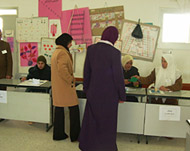 |
|
Palestinians want the winning |
Palestinian officials and pollsters said they expected a high turnout, possibly approaching 65%, which they believed would serve Fatah’s candidate, Abbas.
On Sunday Aljazeera.net toured several polling stations in the southern West Bank, listening to voters’ impressions and expectations.
Muhammad Sayid al-Suyuri, a 60-year-retiree who had worked in Saudi Arabia for over 20 years, said, “We hope that he [the next president] will be able to improve our economic conditions, maybe give us free electricity, free education and free water.”
‘Not by elections’
Others, such as Ahmad Darawish, a 73-year-old farmer from Dura, said the act of holding the election was good in itself. “A people who don’t elect their leaders and rulers freely are slaves or even worse,” he said.
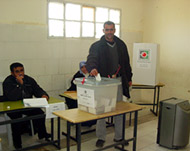 |
|
Voting went off without a hitch |
“From now on, Arab peoples around us need not learn democracy from the west. They can learn it from us.”
However, Darawish conceded that no matter how democratic the Palestinian political system, it wouldn’t do much to liberate the people from Israeli occupation.
In some localities, such as Khursa, 46km south of Jerusalem, Fatah activists were spotted bringing elderly people to the local polling station and encouraging them to vote for the movement’s candidate, Abu Mazin.
Case for boycott
Altercations between Fatah supporters and those backing independent candidate Mustafa Barghuthi reportedly broke out in some villages.
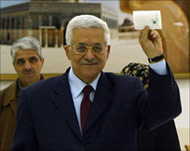 |
|
Fatah’s Abbas cast his ballot at |
However, the shouting matches did not degenerate into violent clashes.
For all the enthusiasm and festive atmosphere, many eligible voters boycotted the election, either in deference to Hamas’ call to that effect or because they didn’t think that the election would palpably improve the overall political situation.
Among them was Ali Hijjah, a construction worker from Khursa.
In his view, neither Abbas nor any other candidate will be able extract “anything from the stingy Sharon”.
“I am not against democracy,” he said. “The Arab world needs democracy, but this election under the Israeli occupation is like placing the carriage before the horse.”
Deceived again
Hijjah cited another reason for boycotting the vote.
“I am convinced that Abu Mazin will retain the same corrupt people who stole millions from the people, and in case he tried to remove them, let alone prosecute them for their crimes, they might very well kill him,” he said.
|
“In 1995, every Palestinian thought he would obtain a brand new car and be able to build an elegant red-tiled villa. I am afraid we are about to suffer the Abd al-Karim Titi, |
Another Palestinian who didn’t cast his ballot, Abd al-Karim Titi, of the Fawar refugee camp, south of Hebron, said Palestinians are being deceived once again.
“In 1995, every Palestinian thought he would obtain a brand new car and be able to build an elegant red-tiled villa. I am afraid we are about to suffer the same nightmare again, this time under Abu Mazin instead of Arafat,” he said.
Western observers from North America and Europe apart, delegates from several Arab and Asian countries, notably Egypt and Jordan, were on hand in the West Bank and Gaza Strip to monitor the election and ensure its transparency.
No major problems
Shireen Abu Akla, Aljazeera’s correspondent, quoted the Palestinian central electoral commission as saying that voting had gone off calmly and turnout was high in Tulkarim, the Jenin refugee camp and Nablus, all in the West Bank.
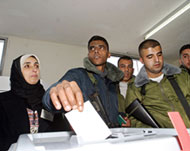 |
|
Al-Aqsa Martrys’ Brigades leader |
However, there were reports of problems, Shireen Abu Akla said, from Jenin, arising from the use of civil lists to verify the identity of some citizens who decided to cast their ballots at the last moment. Apparently, they could not find their names or locate the correct polling stations.
In another case, voters in Bita village contacted Aljazeera’s correspondent to complain about the travel restrictions imposed by temporary roadblocks erected by Israeli forces.
In Tulkarim, such roadblocks were placed early in the morning but this did not appear to deter Palestinian voters.
Foreign observers told Shireen Abu Akla they had not received any reports of any major problems faced by voters.
Role model
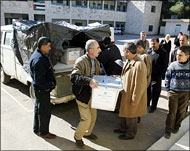 |
|
Some say Palestinian democracy |
Also on Sunday, a large Jordanian delegation, headed by former prime minister Abd al-Salam al-Majali, toured polling stations in the Hebron area.
A member of his group, Khaldun al-Nasir, head of the nationalist centre-right Al-Ahad Party, told Aljazeera.net that the Palestinian elections were very important for the consolidation of democracy throughout the Arab world.
“You people here are practising democracy under the most difficult conditions because of the repugnant Israeli occupation. This in itself should earn you the admiration and respect of the entire world,” al-Nasir said.
“Nobody can belittle this election. In time all Arabs will learn from you and democracy will spread eventually, maybe slowly but definitely.”